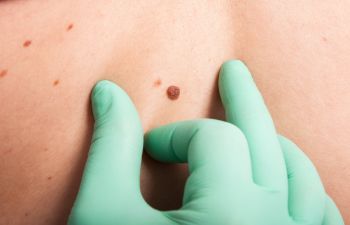
Not all moles are cancerous. In fact, most of them are benign and pose no danger. Sun and UV exposure can increase the risk of skin cancer, especially with direct exposure to existing moles. Using broad-spectrum sunscreen and wearing the proper clothing while outdoors can minimize the risk. Regular skin cancer screenings are essential for at-risk people, but you can also keep tabs on any visible moles. The ABCDE Rule is one dermatologists follow when assessing moles for their likelihood of cancer.
Asymmetrical Shape
Moles that are symmetrical, or evenly shaped all the way around, are typically at lower risk for skin cancer. When they become misshapen, it indicates there is growth, which is a sign of melanoma. Any asymmetrical moles should be biopsied.
Borders That are Uneven
Even symmetrical moles should have a smooth edge all the way around. If the border has become scalloped or has changed from its original formation, you should make an appointment to have it evaluated by your dermatologist.
Colors
Moles can appear in a spectrum of colors, from pale to black. The darkest colors, primarily black, are more likely to be skin cancer. If the mole’s color has changed or you notice more than one color, it’s time to get it looked at.
Diameter
No mole is the same, and that includes size. However, moles larger than 6mm should be watched closely. Even if the mole tests negative for skin cancer, your dermatologist may want to remove it due to the potential for cancer in the future.
Evolving Over Time
A non-cancerous mole will never change over time in any of the above features. If you notice changes, you should notify your doctor and ensure they are aware so they can perform a biopsy. At this point, they may also recommend a thorough cancer screening to rule out other potentially cancerous moles.
Contact Medical Dermatology Specialists to schedule your consultation if you are at risk for skin cancer or are concerned about a mole. Our experienced team is ready to answer your questions and create a personalized treatment plan based on your skin cancer screening.
Medical Dermatology Specialists,
5730 Glenridge Dr, Suite T-100
Atlanta, GA 30328
(404) 939-9220
Monday – Thursday 7:30 AM – 5:00 PM
Posted on behalf of
5730 Glenridge Drive, Suite T-100
Atlanta, GA 30328
Phone: Call (404) 939-9220
FAX: (470) 312-2157
Email: jstalls@atlmedderm.com


